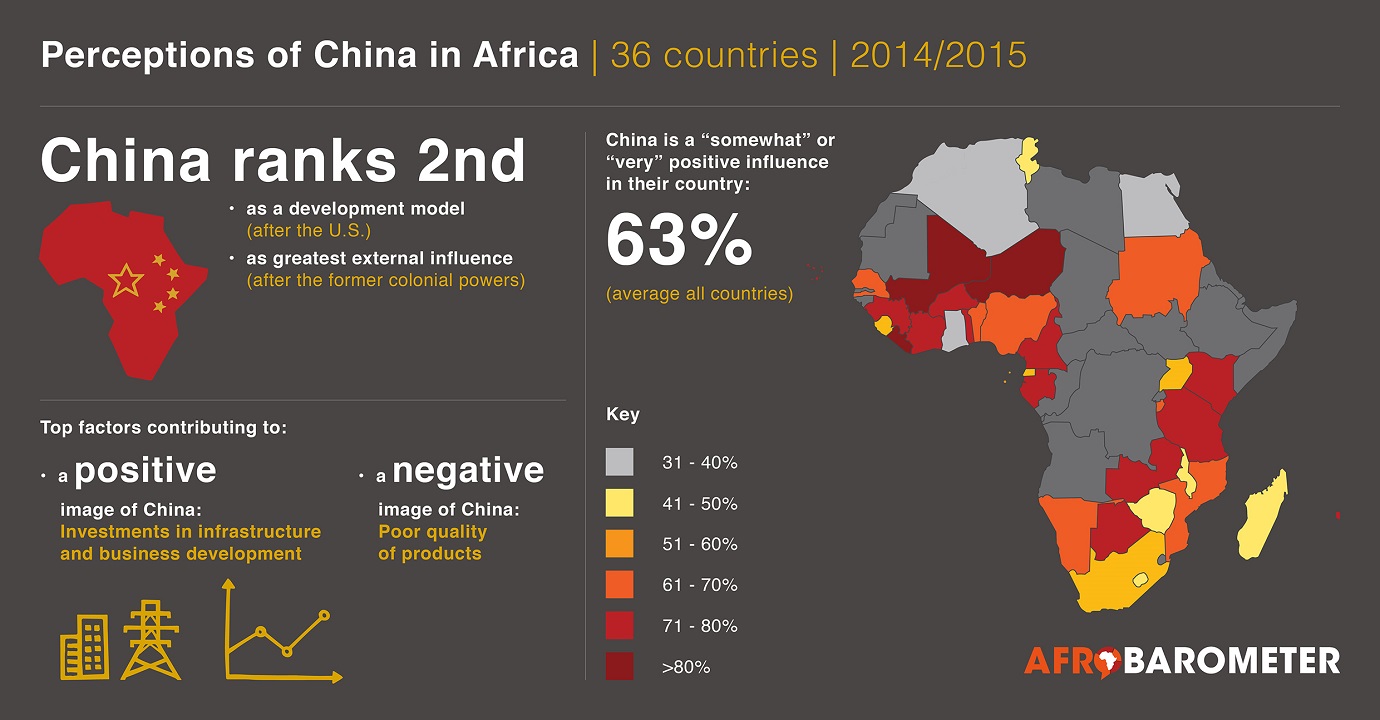
Originally posted on Monkey Cage Blog.
 Kim Yi Dionne is Five College Assistant Professor of Government at Smith College. She studies identity, public opinion, political behavior, and policy aimed at improving the human condition, with a focus on African countries.
Kim Yi Dionne is Five College Assistant Professor of Government at Smith College. She studies identity, public opinion, political behavior, and policy aimed at improving the human condition, with a focus on African countries.
This post is part of our Friday Afrobarometer series, which highlights findings from the pan-African, nonpartisan research network that conducts public-attitude surveys on democracy, governance, economic conditions and related issues in more than 35 countries in Africa.
Scholars and analysts debate about China’s growing influence in Africa. Just in The Monkey Cage, we’ve featured posts asking whether China’s influence in Africa is something to fear, how China’s role in Africa isn’t as dominant as we think, why fearing Chinese aid to Africa is wrong, and still more. These accounts are largely written from an American perspective.
But what do Africans think of China’s influence in Africa?
This week, Afrobarometer — an African-led research network conducting surveys in 36 African countries — released a report detailing citizens’ attitudes toward China. They’re mostly positive.

Across the countries surveyed, 63 percent of respondents thought China’s economic and political influence in their country was positive. In Mali, 92 percent of citizens said China’s influence in Mali was positive. The countries in which less than half of the respondents had a positive opinion about China’s influence included Algeria, Egypt, Ghana, Lesotho, Madagascar, Morocco and Zimbabwe.
While still positive, the average African opinion on China’s economic development assistance was less enthusiastic. Afrobarometer asked, “In your opinion, does China’s economic development assistance to your country do a good job or a bad job of meeting the country’s needs, or haven’t you heard enough to say?” More than half (56 percent) of the nearly 54,000 survey participants though China’s development assistance was doing a good job in their country, with Malians again having the highest proportion of citizens with favorable attitudes (88 percent).
Why does China have such a positive image in Africa? Afrobarometer asked survey participants to name what factor contributes most to a positive image of China in their country. The most frequent response was China’s investment in infrastructure and development (32 percent), followed by the low cost of Chinese products (23 percent).
Cheap Chinese products, however, are also a source of China’s negative image in Africa. The poor quality of Chinese products was the most significant factor shaping Afrobarometer’s survey participants’ negative images of China — mentioned by 35 percent of respondents. Second to product quality in shaping a negative image of China was the perception among Africans that Chinese take jobs or business from locals — mentioned by 14 percent of respondents.
These mostly positive assessments of China do not necessarily mean China has displaced the West in Africans’ attitudes toward external influences. On the contrary, many Africans (30 percent) see the United States as the most popular model for national development, followed closely by China (24 percent). Likewise, more Africans see their former colonial powers as having the greatest influence (28 percent), compared to China (cited by 23 percent) and the United States (cited by 22 percent).
So, if we had to place this report of citizens’ attitudes on a continuum of concern about China in Africa, it would join the growing chorus of scholars that China’s influence in Africa is not something to be feared.
Related content


